Report: The Code of Ethics and Conduct for Australian Nurses
VerifiedAdded on 2020/02/03
|9
|2225
|249
Report
AI Summary
This report provides an overview of the Code of Ethics and Professional Conduct for Nurses in Australia, as established by the Nursing and Midwifery Board of Australia (NMBA). It explores the significance of these codes in regulating the nursing profession, ensuring safe practices, and promoting professional development. The report examines key aspects such as ethical decision-making, patient care, and the responsibilities of registered nurses. It delves into the eight value statements within the Code of Ethics, including self, person, colleagues, and community, and their implications for clinical practice. Additionally, it discusses the Code of Professional Conduct, highlighting its role in defining minimum standards and fostering public trust. The report emphasizes the importance of adhering to these guidelines for maintaining ethical standards, enhancing the quality of care, and promoting the well-being of both patients and nurses.
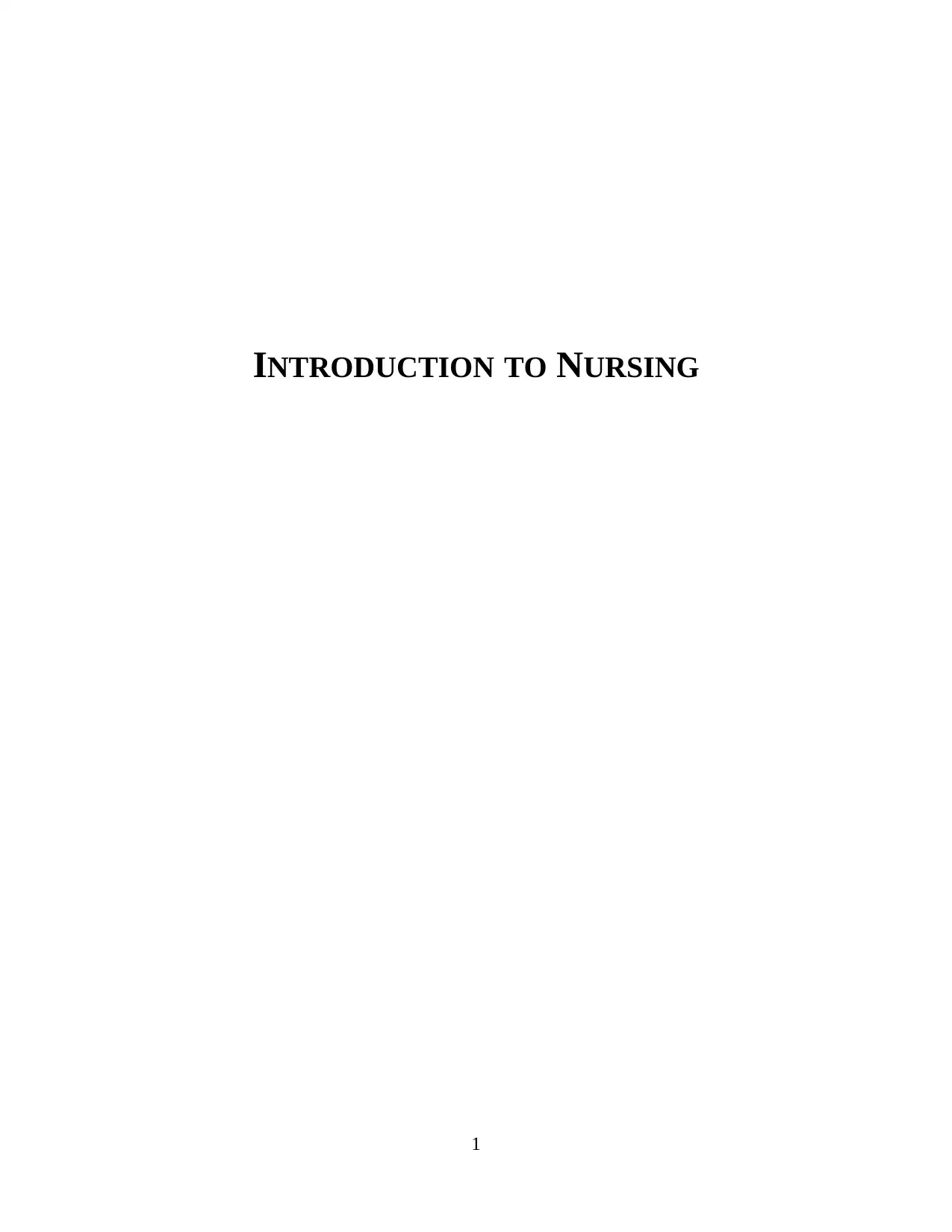
INTRODUCTION TO NURSING
1
1
Paraphrase This Document
Need a fresh take? Get an instant paraphrase of this document with our AI Paraphraser
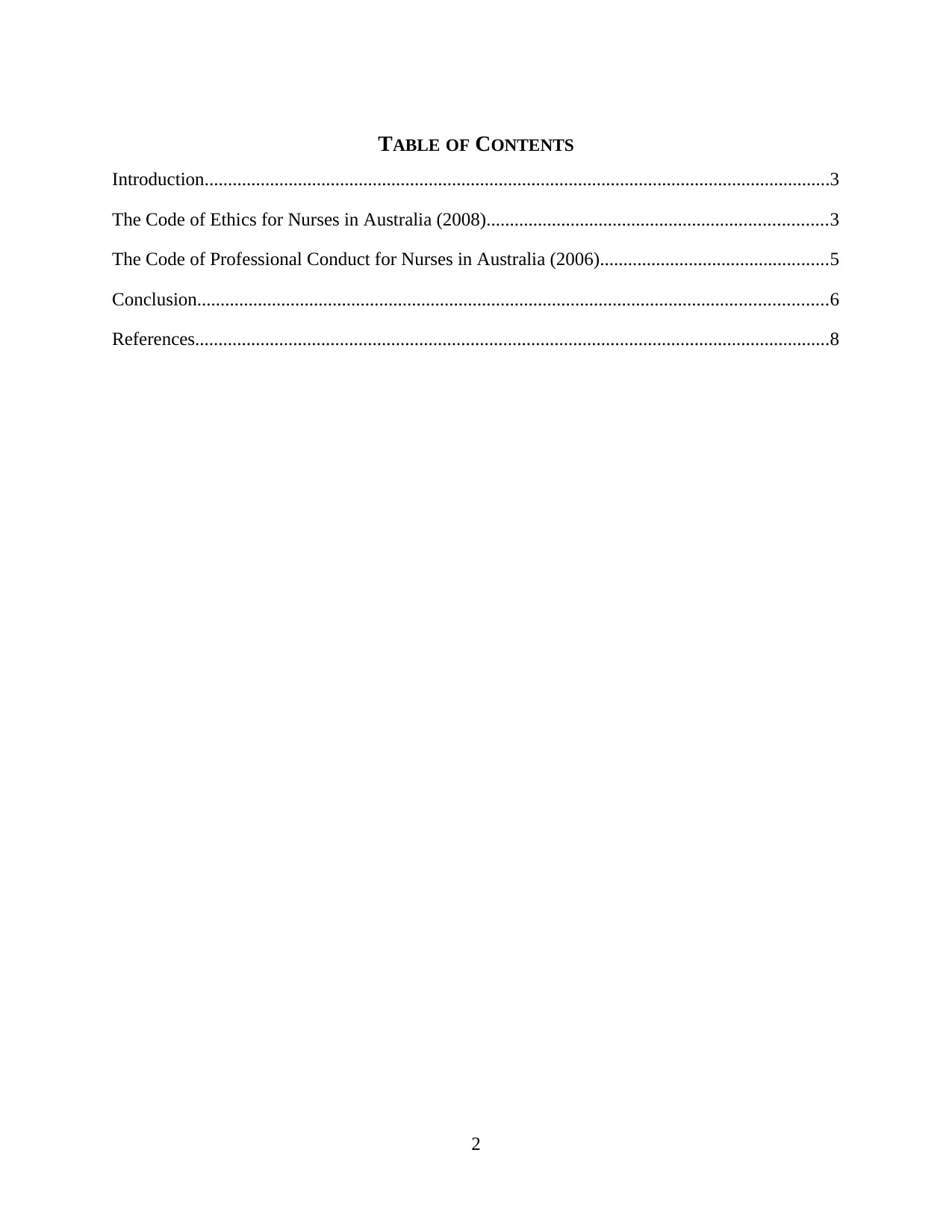
TABLE OF CONTENTS
Introduction......................................................................................................................................3
The Code of Ethics for Nurses in Australia (2008).........................................................................3
The Code of Professional Conduct for Nurses in Australia (2006).................................................5
Conclusion.......................................................................................................................................6
References........................................................................................................................................8
2
Introduction......................................................................................................................................3
The Code of Ethics for Nurses in Australia (2008).........................................................................3
The Code of Professional Conduct for Nurses in Australia (2006).................................................5
Conclusion.......................................................................................................................................6
References........................................................................................................................................8
2
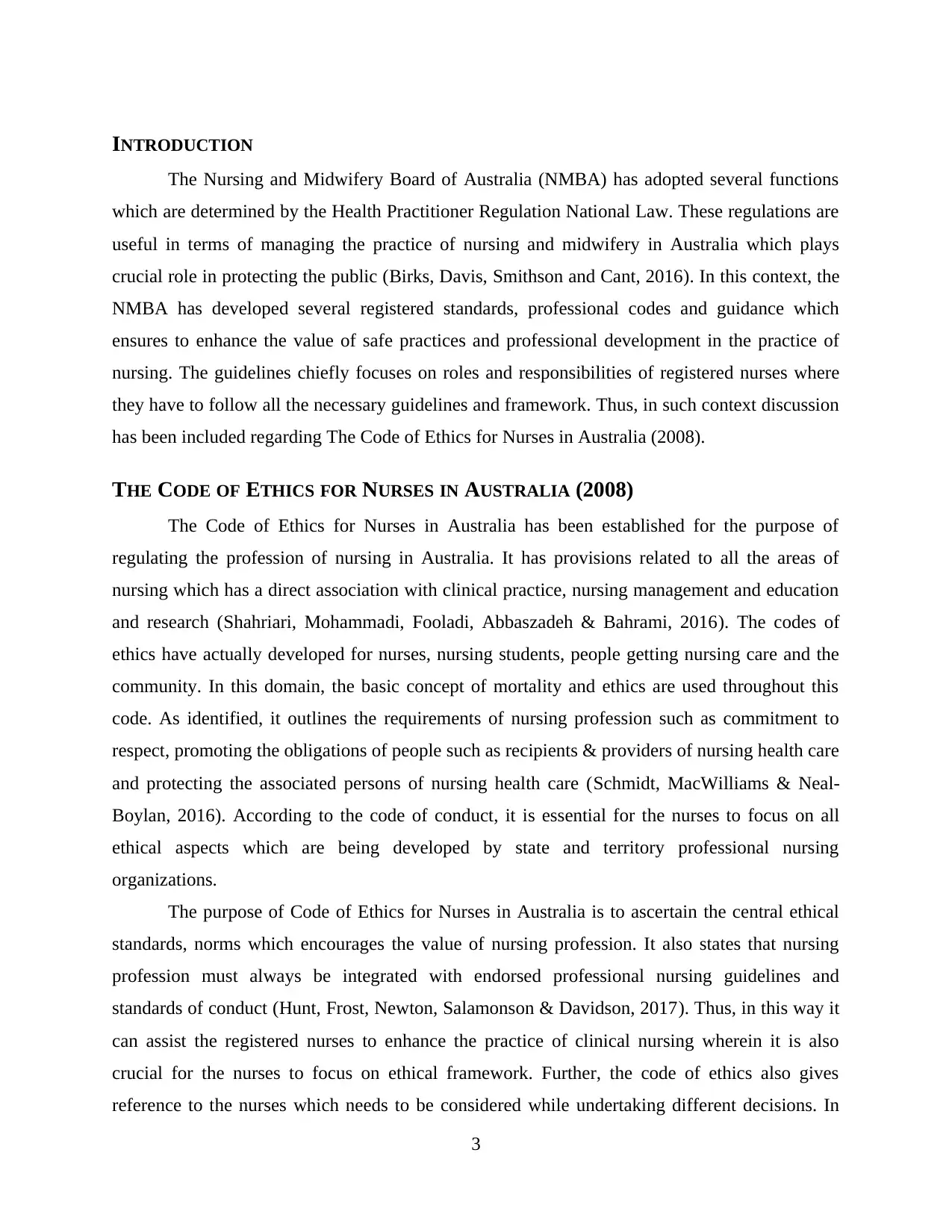
INTRODUCTION
The Nursing and Midwifery Board of Australia (NMBA) has adopted several functions
which are determined by the Health Practitioner Regulation National Law. These regulations are
useful in terms of managing the practice of nursing and midwifery in Australia which plays
crucial role in protecting the public (Birks, Davis, Smithson and Cant, 2016). In this context, the
NMBA has developed several registered standards, professional codes and guidance which
ensures to enhance the value of safe practices and professional development in the practice of
nursing. The guidelines chiefly focuses on roles and responsibilities of registered nurses where
they have to follow all the necessary guidelines and framework. Thus, in such context discussion
has been included regarding The Code of Ethics for Nurses in Australia (2008).
THE CODE OF ETHICS FOR NURSES IN AUSTRALIA (2008)
The Code of Ethics for Nurses in Australia has been established for the purpose of
regulating the profession of nursing in Australia. It has provisions related to all the areas of
nursing which has a direct association with clinical practice, nursing management and education
and research (Shahriari, Mohammadi, Fooladi, Abbaszadeh & Bahrami, 2016). The codes of
ethics have actually developed for nurses, nursing students, people getting nursing care and the
community. In this domain, the basic concept of mortality and ethics are used throughout this
code. As identified, it outlines the requirements of nursing profession such as commitment to
respect, promoting the obligations of people such as recipients & providers of nursing health care
and protecting the associated persons of nursing health care (Schmidt, MacWilliams & Neal-
Boylan, 2016). According to the code of conduct, it is essential for the nurses to focus on all
ethical aspects which are being developed by state and territory professional nursing
organizations.
The purpose of Code of Ethics for Nurses in Australia is to ascertain the central ethical
standards, norms which encourages the value of nursing profession. It also states that nursing
profession must always be integrated with endorsed professional nursing guidelines and
standards of conduct (Hunt, Frost, Newton, Salamonson & Davidson, 2017). Thus, in this way it
can assist the registered nurses to enhance the practice of clinical nursing wherein it is also
crucial for the nurses to focus on ethical framework. Further, the code of ethics also gives
reference to the nurses which needs to be considered while undertaking different decisions. In
3
The Nursing and Midwifery Board of Australia (NMBA) has adopted several functions
which are determined by the Health Practitioner Regulation National Law. These regulations are
useful in terms of managing the practice of nursing and midwifery in Australia which plays
crucial role in protecting the public (Birks, Davis, Smithson and Cant, 2016). In this context, the
NMBA has developed several registered standards, professional codes and guidance which
ensures to enhance the value of safe practices and professional development in the practice of
nursing. The guidelines chiefly focuses on roles and responsibilities of registered nurses where
they have to follow all the necessary guidelines and framework. Thus, in such context discussion
has been included regarding The Code of Ethics for Nurses in Australia (2008).
THE CODE OF ETHICS FOR NURSES IN AUSTRALIA (2008)
The Code of Ethics for Nurses in Australia has been established for the purpose of
regulating the profession of nursing in Australia. It has provisions related to all the areas of
nursing which has a direct association with clinical practice, nursing management and education
and research (Shahriari, Mohammadi, Fooladi, Abbaszadeh & Bahrami, 2016). The codes of
ethics have actually developed for nurses, nursing students, people getting nursing care and the
community. In this domain, the basic concept of mortality and ethics are used throughout this
code. As identified, it outlines the requirements of nursing profession such as commitment to
respect, promoting the obligations of people such as recipients & providers of nursing health care
and protecting the associated persons of nursing health care (Schmidt, MacWilliams & Neal-
Boylan, 2016). According to the code of conduct, it is essential for the nurses to focus on all
ethical aspects which are being developed by state and territory professional nursing
organizations.
The purpose of Code of Ethics for Nurses in Australia is to ascertain the central ethical
standards, norms which encourages the value of nursing profession. It also states that nursing
profession must always be integrated with endorsed professional nursing guidelines and
standards of conduct (Hunt, Frost, Newton, Salamonson & Davidson, 2017). Thus, in this way it
can assist the registered nurses to enhance the practice of clinical nursing wherein it is also
crucial for the nurses to focus on ethical framework. Further, the code of ethics also gives
reference to the nurses which needs to be considered while undertaking different decisions. In
3
⊘ This is a preview!⊘
Do you want full access?
Subscribe today to unlock all pages.

Trusted by 1+ million students worldwide
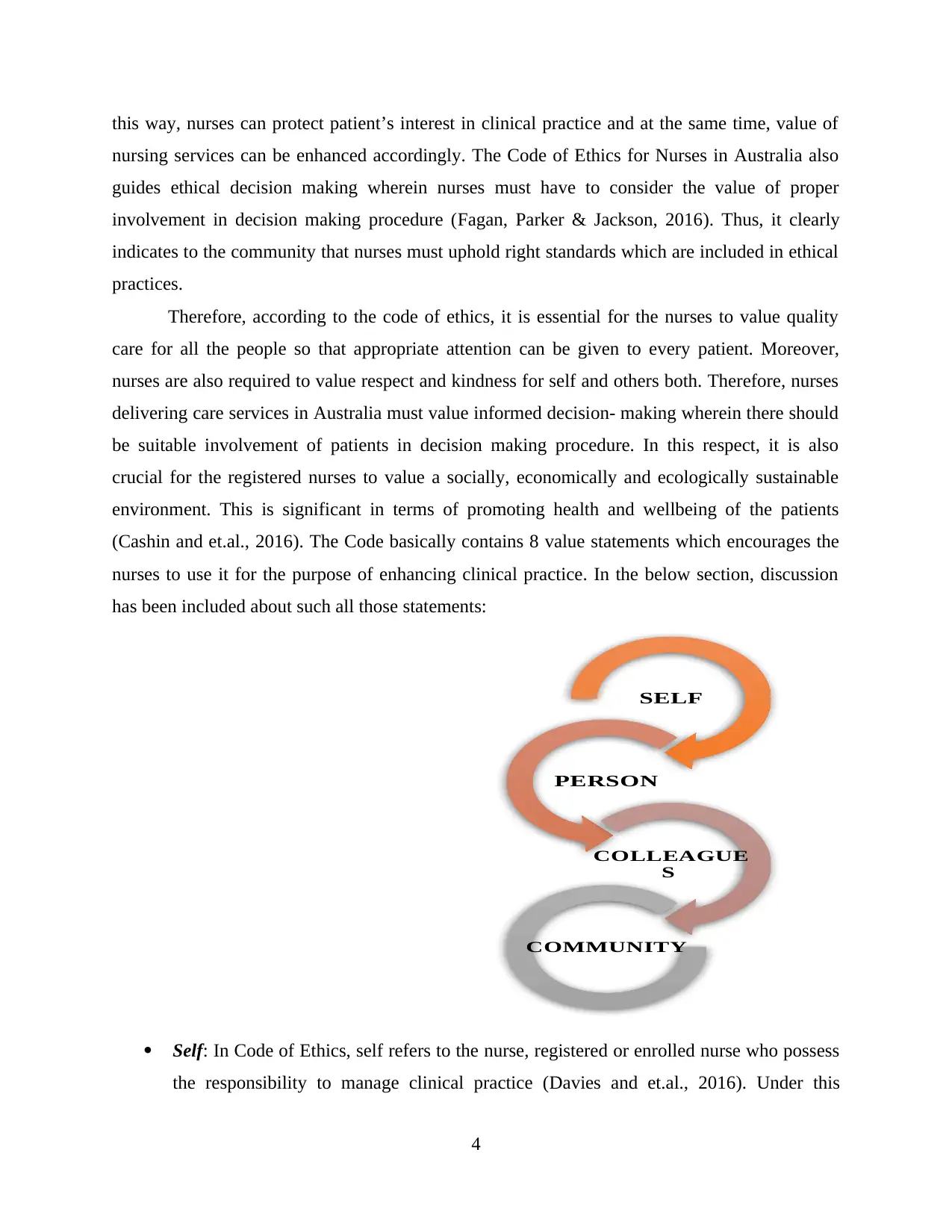
this way, nurses can protect patient’s interest in clinical practice and at the same time, value of
nursing services can be enhanced accordingly. The Code of Ethics for Nurses in Australia also
guides ethical decision making wherein nurses must have to consider the value of proper
involvement in decision making procedure (Fagan, Parker & Jackson, 2016). Thus, it clearly
indicates to the community that nurses must uphold right standards which are included in ethical
practices.
Therefore, according to the code of ethics, it is essential for the nurses to value quality
care for all the people so that appropriate attention can be given to every patient. Moreover,
nurses are also required to value respect and kindness for self and others both. Therefore, nurses
delivering care services in Australia must value informed decision- making wherein there should
be suitable involvement of patients in decision making procedure. In this respect, it is also
crucial for the registered nurses to value a socially, economically and ecologically sustainable
environment. This is significant in terms of promoting health and wellbeing of the patients
(Cashin and et.al., 2016). The Code basically contains 8 value statements which encourages the
nurses to use it for the purpose of enhancing clinical practice. In the below section, discussion
has been included about such all those statements:
Self: In Code of Ethics, self refers to the nurse, registered or enrolled nurse who possess
the responsibility to manage clinical practice (Davies and et.al., 2016). Under this
4
SELF
PERSON
COLLEAGUE
S
COMMUNITY
nursing services can be enhanced accordingly. The Code of Ethics for Nurses in Australia also
guides ethical decision making wherein nurses must have to consider the value of proper
involvement in decision making procedure (Fagan, Parker & Jackson, 2016). Thus, it clearly
indicates to the community that nurses must uphold right standards which are included in ethical
practices.
Therefore, according to the code of ethics, it is essential for the nurses to value quality
care for all the people so that appropriate attention can be given to every patient. Moreover,
nurses are also required to value respect and kindness for self and others both. Therefore, nurses
delivering care services in Australia must value informed decision- making wherein there should
be suitable involvement of patients in decision making procedure. In this respect, it is also
crucial for the registered nurses to value a socially, economically and ecologically sustainable
environment. This is significant in terms of promoting health and wellbeing of the patients
(Cashin and et.al., 2016). The Code basically contains 8 value statements which encourages the
nurses to use it for the purpose of enhancing clinical practice. In the below section, discussion
has been included about such all those statements:
Self: In Code of Ethics, self refers to the nurse, registered or enrolled nurse who possess
the responsibility to manage clinical practice (Davies and et.al., 2016). Under this
4
SELF
PERSON
COLLEAGUE
S
COMMUNITY
Paraphrase This Document
Need a fresh take? Get an instant paraphrase of this document with our AI Paraphraser
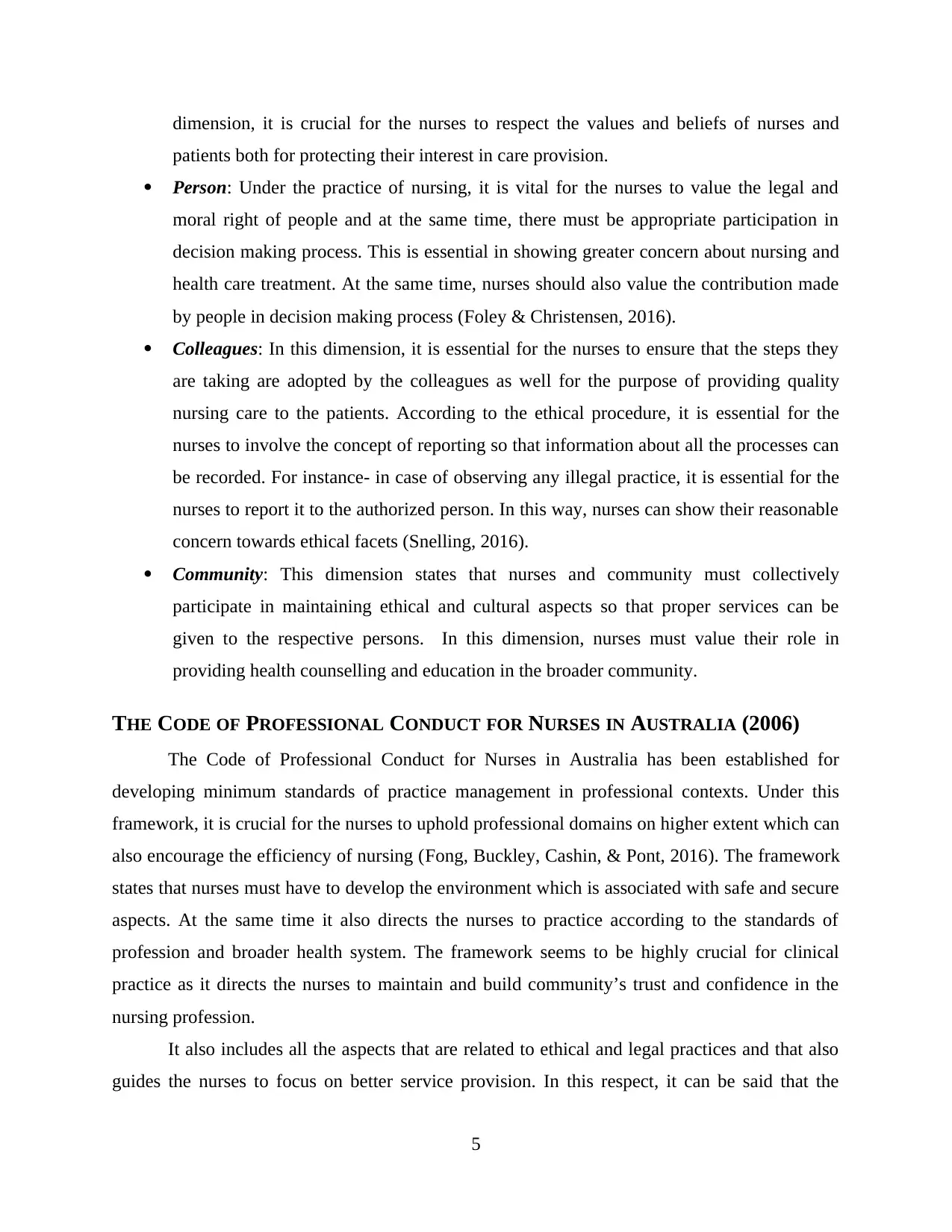
dimension, it is crucial for the nurses to respect the values and beliefs of nurses and
patients both for protecting their interest in care provision.
Person: Under the practice of nursing, it is vital for the nurses to value the legal and
moral right of people and at the same time, there must be appropriate participation in
decision making process. This is essential in showing greater concern about nursing and
health care treatment. At the same time, nurses should also value the contribution made
by people in decision making process (Foley & Christensen, 2016).
Colleagues: In this dimension, it is essential for the nurses to ensure that the steps they
are taking are adopted by the colleagues as well for the purpose of providing quality
nursing care to the patients. According to the ethical procedure, it is essential for the
nurses to involve the concept of reporting so that information about all the processes can
be recorded. For instance- in case of observing any illegal practice, it is essential for the
nurses to report it to the authorized person. In this way, nurses can show their reasonable
concern towards ethical facets (Snelling, 2016).
Community: This dimension states that nurses and community must collectively
participate in maintaining ethical and cultural aspects so that proper services can be
given to the respective persons. In this dimension, nurses must value their role in
providing health counselling and education in the broader community.
THE CODE OF PROFESSIONAL CONDUCT FOR NURSES IN AUSTRALIA (2006)
The Code of Professional Conduct for Nurses in Australia has been established for
developing minimum standards of practice management in professional contexts. Under this
framework, it is crucial for the nurses to uphold professional domains on higher extent which can
also encourage the efficiency of nursing (Fong, Buckley, Cashin, & Pont, 2016). The framework
states that nurses must have to develop the environment which is associated with safe and secure
aspects. At the same time it also directs the nurses to practice according to the standards of
profession and broader health system. The framework seems to be highly crucial for clinical
practice as it directs the nurses to maintain and build community’s trust and confidence in the
nursing profession.
It also includes all the aspects that are related to ethical and legal practices and that also
guides the nurses to focus on better service provision. In this respect, it can be said that the
5
patients both for protecting their interest in care provision.
Person: Under the practice of nursing, it is vital for the nurses to value the legal and
moral right of people and at the same time, there must be appropriate participation in
decision making process. This is essential in showing greater concern about nursing and
health care treatment. At the same time, nurses should also value the contribution made
by people in decision making process (Foley & Christensen, 2016).
Colleagues: In this dimension, it is essential for the nurses to ensure that the steps they
are taking are adopted by the colleagues as well for the purpose of providing quality
nursing care to the patients. According to the ethical procedure, it is essential for the
nurses to involve the concept of reporting so that information about all the processes can
be recorded. For instance- in case of observing any illegal practice, it is essential for the
nurses to report it to the authorized person. In this way, nurses can show their reasonable
concern towards ethical facets (Snelling, 2016).
Community: This dimension states that nurses and community must collectively
participate in maintaining ethical and cultural aspects so that proper services can be
given to the respective persons. In this dimension, nurses must value their role in
providing health counselling and education in the broader community.
THE CODE OF PROFESSIONAL CONDUCT FOR NURSES IN AUSTRALIA (2006)
The Code of Professional Conduct for Nurses in Australia has been established for
developing minimum standards of practice management in professional contexts. Under this
framework, it is crucial for the nurses to uphold professional domains on higher extent which can
also encourage the efficiency of nursing (Fong, Buckley, Cashin, & Pont, 2016). The framework
states that nurses must have to develop the environment which is associated with safe and secure
aspects. At the same time it also directs the nurses to practice according to the standards of
profession and broader health system. The framework seems to be highly crucial for clinical
practice as it directs the nurses to maintain and build community’s trust and confidence in the
nursing profession.
It also includes all the aspects that are related to ethical and legal practices and that also
guides the nurses to focus on better service provision. In this respect, it can be said that the
5
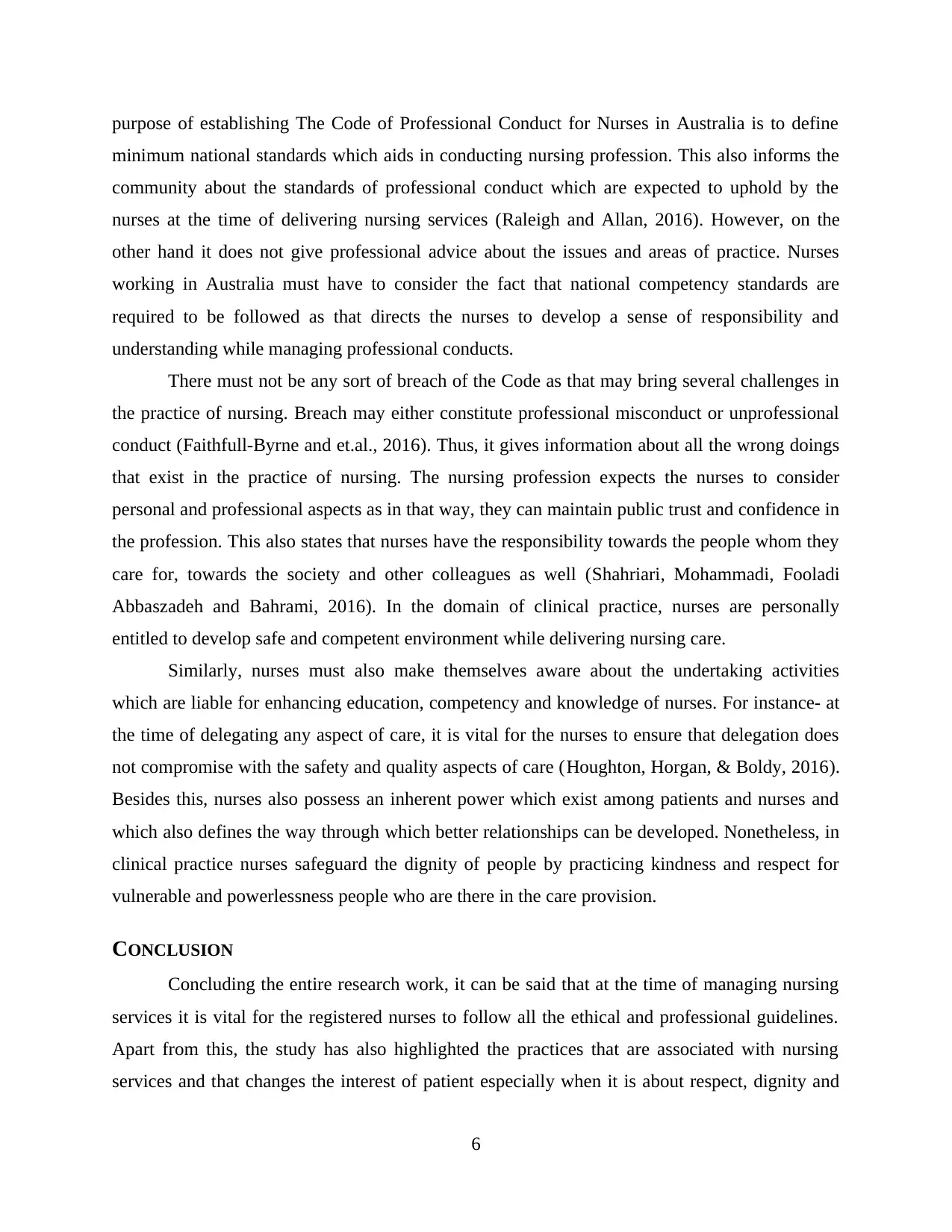
purpose of establishing The Code of Professional Conduct for Nurses in Australia is to define
minimum national standards which aids in conducting nursing profession. This also informs the
community about the standards of professional conduct which are expected to uphold by the
nurses at the time of delivering nursing services (Raleigh and Allan, 2016). However, on the
other hand it does not give professional advice about the issues and areas of practice. Nurses
working in Australia must have to consider the fact that national competency standards are
required to be followed as that directs the nurses to develop a sense of responsibility and
understanding while managing professional conducts.
There must not be any sort of breach of the Code as that may bring several challenges in
the practice of nursing. Breach may either constitute professional misconduct or unprofessional
conduct (Faithfull-Byrne and et.al., 2016). Thus, it gives information about all the wrong doings
that exist in the practice of nursing. The nursing profession expects the nurses to consider
personal and professional aspects as in that way, they can maintain public trust and confidence in
the profession. This also states that nurses have the responsibility towards the people whom they
care for, towards the society and other colleagues as well (Shahriari, Mohammadi, Fooladi
Abbaszadeh and Bahrami, 2016). In the domain of clinical practice, nurses are personally
entitled to develop safe and competent environment while delivering nursing care.
Similarly, nurses must also make themselves aware about the undertaking activities
which are liable for enhancing education, competency and knowledge of nurses. For instance- at
the time of delegating any aspect of care, it is vital for the nurses to ensure that delegation does
not compromise with the safety and quality aspects of care (Houghton, Horgan, & Boldy, 2016).
Besides this, nurses also possess an inherent power which exist among patients and nurses and
which also defines the way through which better relationships can be developed. Nonetheless, in
clinical practice nurses safeguard the dignity of people by practicing kindness and respect for
vulnerable and powerlessness people who are there in the care provision.
CONCLUSION
Concluding the entire research work, it can be said that at the time of managing nursing
services it is vital for the registered nurses to follow all the ethical and professional guidelines.
Apart from this, the study has also highlighted the practices that are associated with nursing
services and that changes the interest of patient especially when it is about respect, dignity and
6
minimum national standards which aids in conducting nursing profession. This also informs the
community about the standards of professional conduct which are expected to uphold by the
nurses at the time of delivering nursing services (Raleigh and Allan, 2016). However, on the
other hand it does not give professional advice about the issues and areas of practice. Nurses
working in Australia must have to consider the fact that national competency standards are
required to be followed as that directs the nurses to develop a sense of responsibility and
understanding while managing professional conducts.
There must not be any sort of breach of the Code as that may bring several challenges in
the practice of nursing. Breach may either constitute professional misconduct or unprofessional
conduct (Faithfull-Byrne and et.al., 2016). Thus, it gives information about all the wrong doings
that exist in the practice of nursing. The nursing profession expects the nurses to consider
personal and professional aspects as in that way, they can maintain public trust and confidence in
the profession. This also states that nurses have the responsibility towards the people whom they
care for, towards the society and other colleagues as well (Shahriari, Mohammadi, Fooladi
Abbaszadeh and Bahrami, 2016). In the domain of clinical practice, nurses are personally
entitled to develop safe and competent environment while delivering nursing care.
Similarly, nurses must also make themselves aware about the undertaking activities
which are liable for enhancing education, competency and knowledge of nurses. For instance- at
the time of delegating any aspect of care, it is vital for the nurses to ensure that delegation does
not compromise with the safety and quality aspects of care (Houghton, Horgan, & Boldy, 2016).
Besides this, nurses also possess an inherent power which exist among patients and nurses and
which also defines the way through which better relationships can be developed. Nonetheless, in
clinical practice nurses safeguard the dignity of people by practicing kindness and respect for
vulnerable and powerlessness people who are there in the care provision.
CONCLUSION
Concluding the entire research work, it can be said that at the time of managing nursing
services it is vital for the registered nurses to follow all the ethical and professional guidelines.
Apart from this, the study has also highlighted the practices that are associated with nursing
services and that changes the interest of patient especially when it is about respect, dignity and
6
⊘ This is a preview!⊘
Do you want full access?
Subscribe today to unlock all pages.

Trusted by 1+ million students worldwide
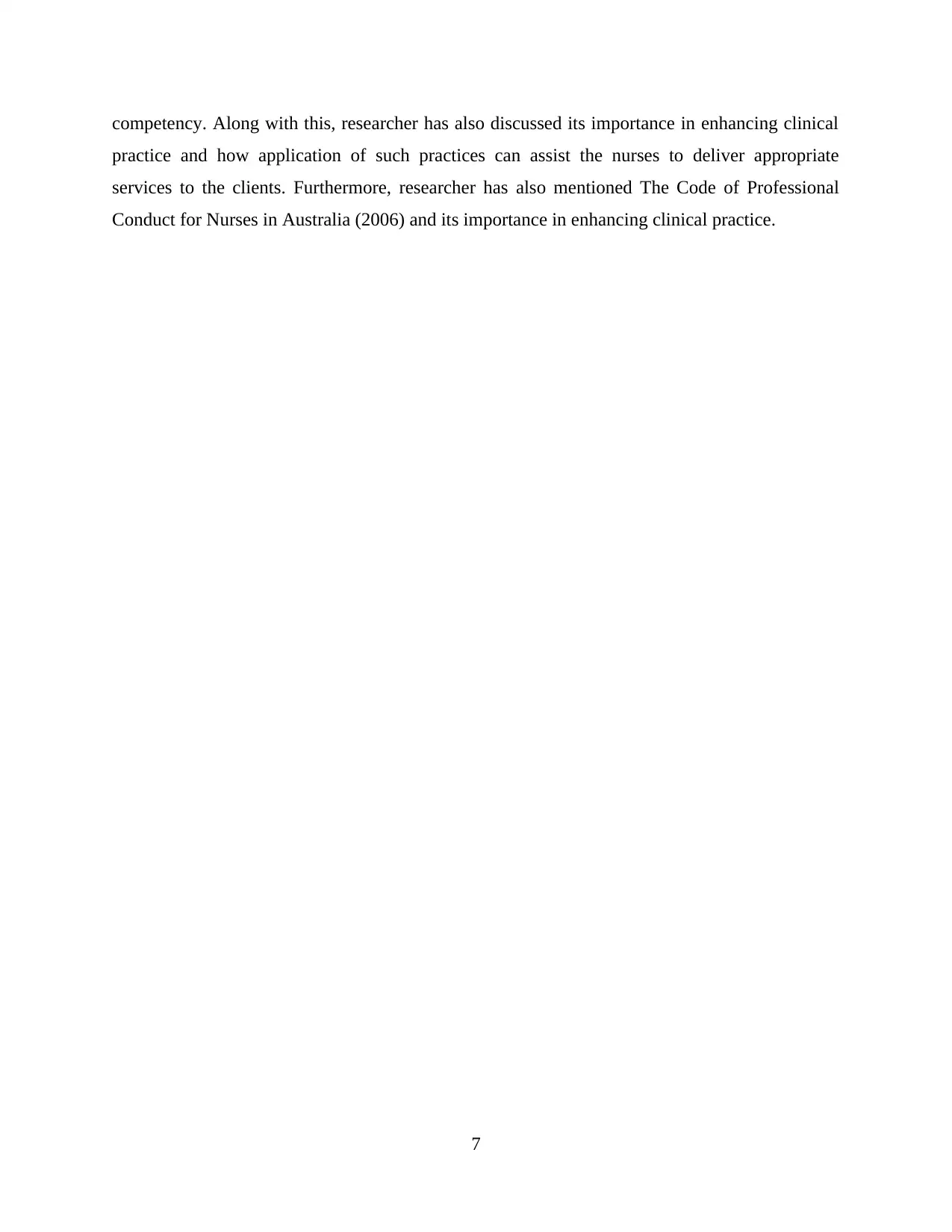
competency. Along with this, researcher has also discussed its importance in enhancing clinical
practice and how application of such practices can assist the nurses to deliver appropriate
services to the clients. Furthermore, researcher has also mentioned The Code of Professional
Conduct for Nurses in Australia (2006) and its importance in enhancing clinical practice.
7
practice and how application of such practices can assist the nurses to deliver appropriate
services to the clients. Furthermore, researcher has also mentioned The Code of Professional
Conduct for Nurses in Australia (2006) and its importance in enhancing clinical practice.
7
Paraphrase This Document
Need a fresh take? Get an instant paraphrase of this document with our AI Paraphraser
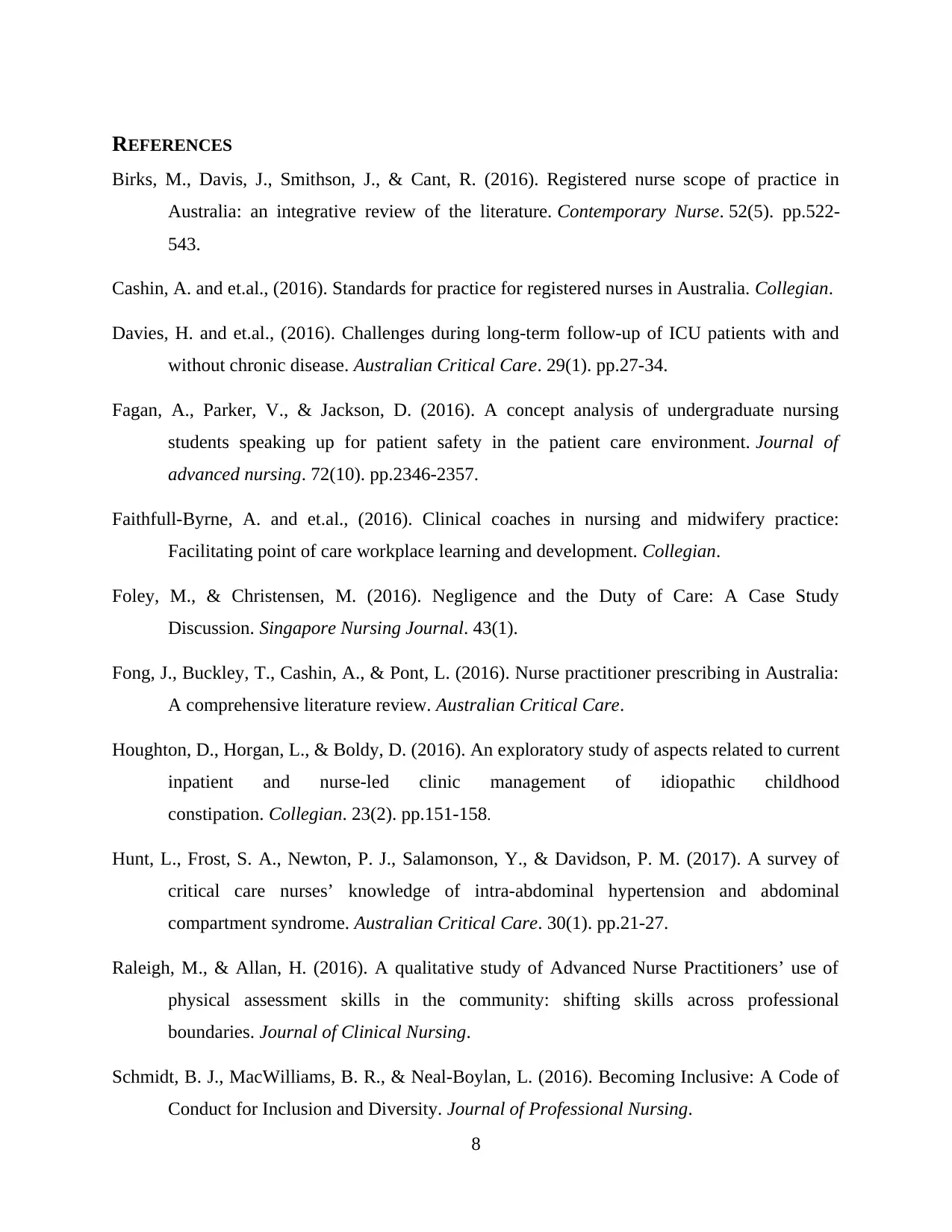
REFERENCES
Birks, M., Davis, J., Smithson, J., & Cant, R. (2016). Registered nurse scope of practice in
Australia: an integrative review of the literature. Contemporary Nurse. 52(5). pp.522-
543.
Cashin, A. and et.al., (2016). Standards for practice for registered nurses in Australia. Collegian.
Davies, H. and et.al., (2016). Challenges during long-term follow-up of ICU patients with and
without chronic disease. Australian Critical Care. 29(1). pp.27-34.
Fagan, A., Parker, V., & Jackson, D. (2016). A concept analysis of undergraduate nursing
students speaking up for patient safety in the patient care environment. Journal of
advanced nursing. 72(10). pp.2346-2357.
Faithfull-Byrne, A. and et.al., (2016). Clinical coaches in nursing and midwifery practice:
Facilitating point of care workplace learning and development. Collegian.
Foley, M., & Christensen, M. (2016). Negligence and the Duty of Care: A Case Study
Discussion. Singapore Nursing Journal. 43(1).
Fong, J., Buckley, T., Cashin, A., & Pont, L. (2016). Nurse practitioner prescribing in Australia:
A comprehensive literature review. Australian Critical Care.
Houghton, D., Horgan, L., & Boldy, D. (2016). An exploratory study of aspects related to current
inpatient and nurse-led clinic management of idiopathic childhood
constipation. Collegian. 23(2). pp.151-158.
Hunt, L., Frost, S. A., Newton, P. J., Salamonson, Y., & Davidson, P. M. (2017). A survey of
critical care nurses’ knowledge of intra-abdominal hypertension and abdominal
compartment syndrome. Australian Critical Care. 30(1). pp.21-27.
Raleigh, M., & Allan, H. (2016). A qualitative study of Advanced Nurse Practitioners’ use of
physical assessment skills in the community: shifting skills across professional
boundaries. Journal of Clinical Nursing.
Schmidt, B. J., MacWilliams, B. R., & Neal-Boylan, L. (2016). Becoming Inclusive: A Code of
Conduct for Inclusion and Diversity. Journal of Professional Nursing.
8
Birks, M., Davis, J., Smithson, J., & Cant, R. (2016). Registered nurse scope of practice in
Australia: an integrative review of the literature. Contemporary Nurse. 52(5). pp.522-
543.
Cashin, A. and et.al., (2016). Standards for practice for registered nurses in Australia. Collegian.
Davies, H. and et.al., (2016). Challenges during long-term follow-up of ICU patients with and
without chronic disease. Australian Critical Care. 29(1). pp.27-34.
Fagan, A., Parker, V., & Jackson, D. (2016). A concept analysis of undergraduate nursing
students speaking up for patient safety in the patient care environment. Journal of
advanced nursing. 72(10). pp.2346-2357.
Faithfull-Byrne, A. and et.al., (2016). Clinical coaches in nursing and midwifery practice:
Facilitating point of care workplace learning and development. Collegian.
Foley, M., & Christensen, M. (2016). Negligence and the Duty of Care: A Case Study
Discussion. Singapore Nursing Journal. 43(1).
Fong, J., Buckley, T., Cashin, A., & Pont, L. (2016). Nurse practitioner prescribing in Australia:
A comprehensive literature review. Australian Critical Care.
Houghton, D., Horgan, L., & Boldy, D. (2016). An exploratory study of aspects related to current
inpatient and nurse-led clinic management of idiopathic childhood
constipation. Collegian. 23(2). pp.151-158.
Hunt, L., Frost, S. A., Newton, P. J., Salamonson, Y., & Davidson, P. M. (2017). A survey of
critical care nurses’ knowledge of intra-abdominal hypertension and abdominal
compartment syndrome. Australian Critical Care. 30(1). pp.21-27.
Raleigh, M., & Allan, H. (2016). A qualitative study of Advanced Nurse Practitioners’ use of
physical assessment skills in the community: shifting skills across professional
boundaries. Journal of Clinical Nursing.
Schmidt, B. J., MacWilliams, B. R., & Neal-Boylan, L. (2016). Becoming Inclusive: A Code of
Conduct for Inclusion and Diversity. Journal of Professional Nursing.
8
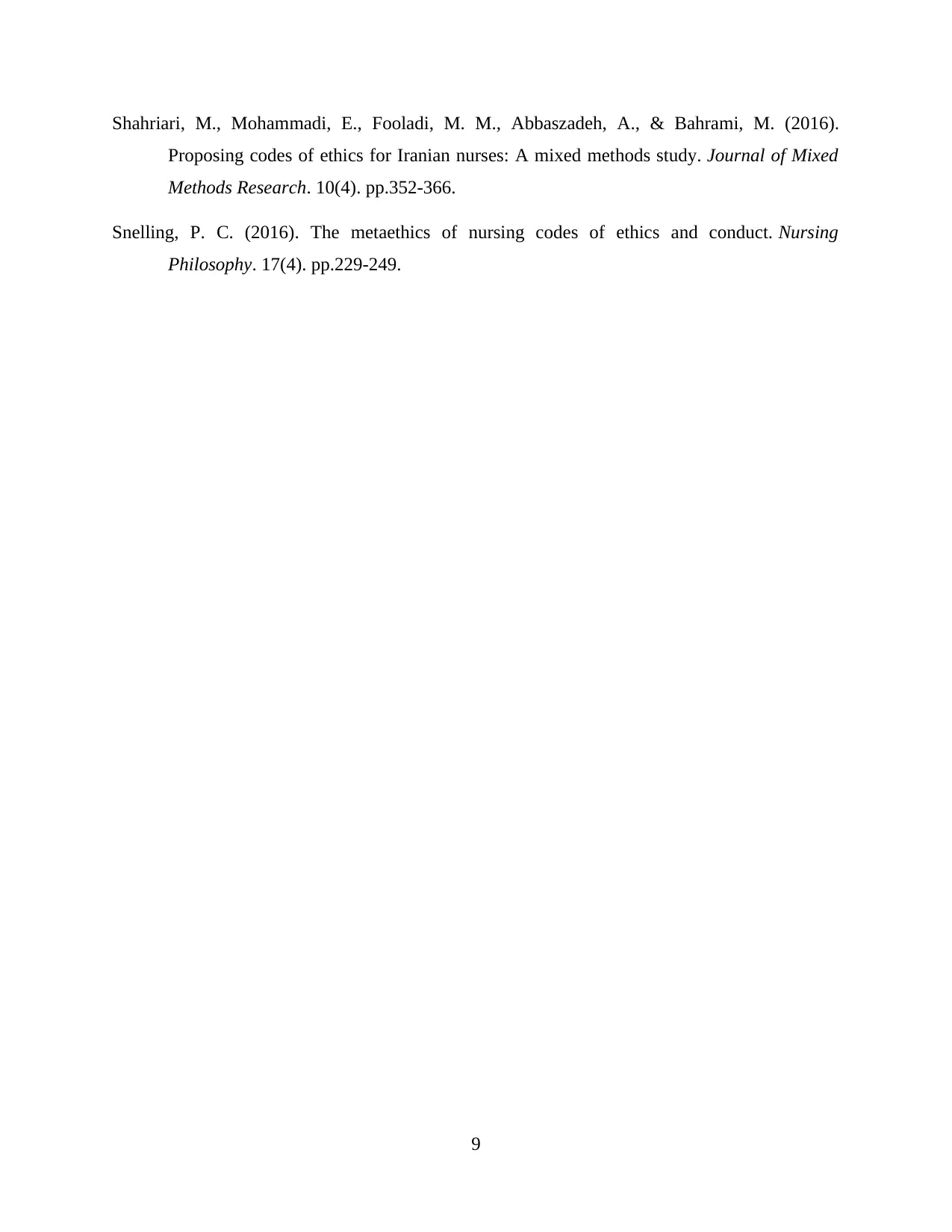
Shahriari, M., Mohammadi, E., Fooladi, M. M., Abbaszadeh, A., & Bahrami, M. (2016).
Proposing codes of ethics for Iranian nurses: A mixed methods study. Journal of Mixed
Methods Research. 10(4). pp.352-366.
Snelling, P. C. (2016). The metaethics of nursing codes of ethics and conduct. Nursing
Philosophy. 17(4). pp.229-249.
9
Proposing codes of ethics for Iranian nurses: A mixed methods study. Journal of Mixed
Methods Research. 10(4). pp.352-366.
Snelling, P. C. (2016). The metaethics of nursing codes of ethics and conduct. Nursing
Philosophy. 17(4). pp.229-249.
9
⊘ This is a preview!⊘
Do you want full access?
Subscribe today to unlock all pages.

Trusted by 1+ million students worldwide
1 out of 9
Related Documents
Your All-in-One AI-Powered Toolkit for Academic Success.
+13062052269
info@desklib.com
Available 24*7 on WhatsApp / Email
![[object Object]](/_next/static/media/star-bottom.7253800d.svg)
Unlock your academic potential
Copyright © 2020–2026 A2Z Services. All Rights Reserved. Developed and managed by ZUCOL.





